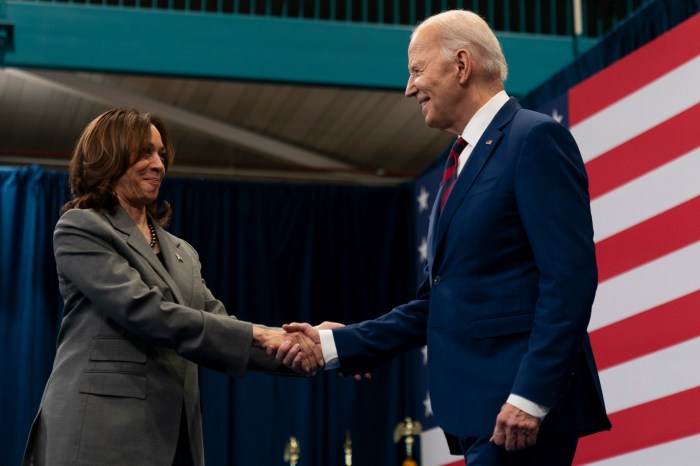Staking out significant new ground in the Obama administration’s legal posture toward the Defense of Marriage Act (DOMA), Attorney General Eric Holder on February 23 informed Republican House Speaker John Boehner that the Justice Department (DOJ) has concluded that, in light of the standard by which the law’s constitutionality should be measured, its bar on federal recognition of marriages by same-sex couples violates their right to equal protection of the law.
Consequently, Holder wrote, DOJ “will cease defense of Section 3,” that portion of the 1996 statute that denies married gay and lesbian couples federal recognition. (The other substantive element in DOMA purportedly allows states to similarly deny such recognition.)
The immediate impact of the new DOJ position is that the administration will not defend DOMA in two pending court cases — one brought by five legally married same-sex couples and a widower from Connecticut, Vermont, and New Hampshire challenging the denial of federal benefits that would otherwise be available to them and a second brought by a New York lesbian, whose marriage to her late wife was recognized by New York State but who was denied federal inheritance tax treatment as a spouse.
Holder’s statement clearly suggests DOJ will be revising the position it has taken to date in other cases related to DOMA, most importantly in its appeal of district court victories challenging the statute by the State of Massachusetts and same-sex couples married there.
Significantly, though Holder spelled out in some detail DOJ’s legal analysis, in a press statement announcing the new position, he explained that President Barack Obama was integrally involved in shaping it.
“After careful consideration, including a review of my recommendation, the president has concluded that given a number of factors, including a documented history of discrimination, classifications based on sexual orientation should be subject to a more heightened standard of scrutiny,” the attorney general wrote of how the administration views the legal standard that DOMA should be held to. “The president has also concluded that Section 3 of DOMA, as applied to legally married same-sex couples, fails to meet that standard and is therefore unconstitutional. Given that conclusion, the president has instructed the Department not to defend the statute in such cases. I fully concur with the president’s determination.”
Given the tradition of the Justice Department working independently of political considerations, the president’s visible role in this development is something of a departure from customary practice and was likely influenced by the flak his administration has caught from the LGBT community over DOJ’s earlier defense of DOMA.
The change in DOJ’s position, however, is not solely a political decision divorced from any legal context. As Holder noted in both his letter to Boehner and the department’s press release, the two lawsuits that precipitated a new analysis of DOMA are being heard in a different federal circuit than the Massachusetts cases — a critical distinction, in the view of the attorney general.
In appealing last summer’s victories against DOMA in Massachusetts, DOJ was arguing in the Boston-based 1st Circuit Court of Appeals. In that venue, Holder noted, the government faced a circuit precedent holding that “laws singling out people based on sexual orientation, as DOMA does, are constitutional if there is a rational basis for their enactment.”
While noting that Obama favors repeal of DOMA, Holder explained that DOJ concluded “reasonable arguments” could be made to defend the statute under the “rational basis standard.”
Oddly, in its Massachusetts appeal, DOJ argued that it was rational in 1996, when DOMA was enacted, for Congress to preserve the status quo on the definition of marriage to maintain the federal government’s neutrality as states considered how to address demands by the gay and lesbian community for equal marriage rights. Imposing a federal definition of marriage, however, was anything but the status quo — in fact, it was unprecedented — and by choosing a traditional definition over evolving notions of family, the federal government was not acting in a neutral fashion.
The newer cases — Pedersen et al. v. Office of Personnel Management, filed in Hartford’s federal district court, and Windsor v. United States, in New York’s — are being litigated in the 2nd Circuit, which is based in New York. Unlike the 1st Circuit in Boston, the 2nd has no binding precedent on the legal standard to which gay anti-discrimination claims should be subjected. As a result, in defending DOMA in that circuit, the government would have to articulate the appropriate standard for review.
This is where DOJ and the president “evolved” — to borrow a metaphor used by Obama several times in discussing his views on marriage equality. In his letter to Boehner, Holder explained that sexual orientation is a category that meets all four significant tests of whether heightened scrutiny should apply to bias claims — gays have “suffered a history of discrimination,”… ‘exhibit obvious, immutable, or distinguishing characteristics that define them as a discrete group,’”… are a minority with a history of political powerlessness, and are distinguishable by characteristics that “have little relation to legitimate policy objectives or to an individual’s ‘ability to perform or contribute to society.’”
Since the administration and DOJ concluded that heightened scrutiny must be applied to DOMA, Holder wrote that the burden in defending the statute is demonstrating it is “substantially related to an important government objective.” The statute’s legislative history from 1996, he argued, proved otherwise; that record showed the law was based on “moral disapproval of gays and lesbians and their intimate and family relationships – precisely the kind of stereotype-based thinking and animus the Equal Protection Clause is designed to guard against.”
The attorney general’s purpose in notifying Boehner of DOJ’s position was to offer Congress “a full and fair opportunity to participate” in defending DOMA in place of the administration. The specific avenue for any congressional intervention in the case is not fully clear. Holder noted, however, that any motions to dismiss the Pederson and Windsor cases are due on March 11.
The attorney general stated that until such time as DOMA is repealed or definitively overturned in the courts, the administration would continue to enforce it.
The Gay & Lesbian Advocates & Defenders, which is litigating the Pederson case and won last year’s district court victories in the Massachusetts lawsuits, issued a statement saying, “It is extraordinarily significant that the Dept. of Justice recognizes what we have been saying for years in our litigation.”
At the same time, GLAD acknowledged that it is the court and not DOJ that will determine the appropriate standard of review. Noting the likely prospect that the House Republican leadership will take an interest in defending DOMA, the group said, “We are prepared to address head on whatever arguments Congress may make.”
The American Civil Liberties Union, which is representing Edith “Edie” Windsor in her lawsuit regarding taxes she was forced to pay on the estate of her late spouse, called the DOJ announcement “an historic show of support for equal treatment under the law.”
Through the ACLU, Windsor herself said, “My only regret is that my beloved late spouse, Thea Spyer, isn’t here today to share in this historic moment. But in my heart, I feel that she knows.”
In a written statement, Evan Wolfson, who heads up Freedom to Marry and has been a primary architect of the movement for equal marriage rights, said, “Freedom to Marry applauds the president and the attorney general for acknowledging that sexual orientation discrimination has no place in American life and must be presumed unconstitutional, recognizing that discriminatory laws like so-called DOMA must be looked at with skeptical eyes, not rubber stamped… This is a momentous step forward toward Freedom to Marry’s goal of ending federal marriage discrimination and fully protecting all loving and committed couples.”

































